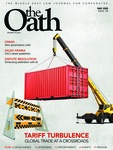News from the DIFC

The Academy of Law for the DIFC has joined forces with the University of Sharjah to help young lawyers in the UAE achieve success in the in the English-language, commercial common law system. The two organisations will collaborate on training initiatives, seminars, conferences and academic research, with a particular emphasis on preparing UAE nationals for dual careers in both the common and civil law systems. The Academy of Law for the DIFC and the University of Sharjah have a longstanding relationship. In 2015, a group of university students and faculty benefitted from the Academy of Law for the DIFC’s USD135,000 initiative to waive tuition fees for its 18-week Academy of Law Certificate in DIFC Courts Laws and Procedures, thereby gaining an in-depth understanding of the parallel system to the Arabic, civil law Dubai Courts. The new partnership was set out in a memorandum signed by David Gallo, Director of the Academy of Law for the DIFC, and Dr. Bashar H. Malkawi, Dean of the University of Sharjah College of Law.
The Academy of Law for the DIFC is part of the Dispute Resolution Authority, which also comprises the DIFC Courts, DIFC Wills and Probate Registry and DIFC-LCIA Arbitration Centre. Its core functions include training and regulating lawyers, publishing Court law reports and academic literature, providing free legal advice for people in need through the region’s first Pro Bono Programme, and hosting events for the development of the rule of law, the legal system and the professional community.
This is the third memorandum signed by the Academy of Law for the DIFC with major educational establishments following similar agreements signed with the University of Dubai and East China University of Political Science and Law.

Last month, the DIFC Courts set out their plan to be among the world’s leading commercial courts by 2021, further cementing their position as Dubai’s international court.
In 2015, the Court of First Instance (CFI) at Dubai’s established English-language, commercial common law judicial system handled cases, including Arbitration related cases and counter claims, valued at approximately AED4.46 billion, a total greater than in 2012, 2013 and 2014 combined. The figure, which compares with AED1.55 billion in 2014, is also the first time the courts have passed the USD1 billion mark in a year.
The significant rise in case value reflects the increased size and complexity of cases rather than an increase in the total number of cases, which actually declined by 10 percent in 2015. The average CFI case value in 2015, excluding arbitration related cases and counter claims, was AED89 million, compared to AED51.1 million in the preceding year, while almost all were international disputes.
It was a particularly busy year for the Courts’ Small Claims Tribunal (SCT), with its workload almost doubling from 116 cases in 2014 to 216 in the following year, reflecting a greater willingness to use this innovative, private, swift and low cost way to resolve disputes amicably, where 90 per cent of all cases are resolved within four weeks. Increasing the SCT’s jurisdiction to handle cases up to AED500,000 also contributed to its growing popularity and ability to support the UAE’s SME sector.
2015 witnessed a number of innovations, including a new fee structure incentivising parties to settle early by rebating court fees, and a system for arranging business visit visas for overseas lawyers. Most notable was the introduction of a world first practice direction whereby a DIFC Courts’ judgment can result in the judgment creditor obtaining an arbitral award which can be enforced in over 150 countries, providing greater enforcement internationally.
International enforcement mechanisms were further strengthened by a string of memoranda in 2015, including with two of the most important commercial courts in the world, the United States District Court for the Southern District of New York and the Supreme Court of Singapore.
Mark Beer, DIFC Courts CEO & registrar said, “2015 was a year of innovationand collaboration for the DIFC Courts as we forged strong ties with other judicial entities in the UAE’s main trading partners while introducing world firsts that further enhanced our legal processes. Through a consistent track record of success in commercial dispute resolution, innovation and enforcement, the DIFC Courts are today recognised as a world class centre of legal excellence. Looking to the future, while we are firmly established as the the pre-eminent centre for English language dispute resolution in the Middle East, it is our aspiration to be one of the world’s leading commercial courts within five years. It is an ambitious but entirely achievable objective for the DIFC Courts team.”
The DIFC Courts also released their 2016-2021 Strategic Plan, which has been developed to actively support federal, local and DIFC strategic objectives, including Dubai Plan 2021 and UAE Vision 2021.
The plan sets out how the DIFC Courts aim to fulfil their aspiration of being one of the world’s leading commercial courts by 2021 by focusing on four key qualities – innovation, judicial excellence, service and court excellence and connectivity.
Amna AlOwais, deputy CEO and deputy registrar of the DIFC Courts, added: “The performance of the DIFC Courts in 2015 serves as an important reminder that Dubai is a place where a contract will be honoured a dispute settled fairly, quickly and efficiently, all essential ingredients for creating a pro-business environment. We look forwards to building on these achievements over the next five years to help make the UAE one of the best places in the world to do business and, in doing so, the DIFC Courts one of the world’s leadings commercial courts.”

























































































































